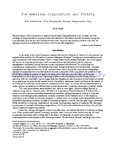| dc.rights.license | In Copyright | en_US |
| dc.creator | Bright, Nicole | |
| dc.date.accessioned | 2013-12-03T13:15:17Z | |
| dc.date.available | 2013-12-03T13:15:17Z | |
| dc.date.created | 2009 | |
| dc.identifier | WLURG38_Bright_POV_2009_wm | |
| dc.identifier.uri | http://hdl.handle.net/11021/24175 | |
| dc.description | Nicole C. Bright is a member of the Class of 2009 of Washington and Lee University School of Law. | en_US |
| dc.description | Capstone; [FULL-TEXT FREELY AVAILABLE ONLINE] | en_US |
| dc.description.abstract | In recent years, the corporate social responsibility (CSR) movement has re-emerged as a response to the failure of the current culture of corporate America to reflect a broad vision of the corporation's social purpose. 8 Today's CSR emphasizes internal, self-regulation; that is, a voluntary adjustment in corporate decision-making. But critics of the current movement, noting the dominance of the profit-maximizing culture, argue that CSR amounts to, at best, a public-relations exercise, and, at worst, "provid[es] a 'fig leaf' for corporate license."10 Such critics have concluded that the current culture is simply the inherent nature of the corporate form; that is, the corporation, as a complex entity, is incapable of socially responsible decision-making.
But this argument fails to acknowledge that the corporation is both a legal and social construct. There is, I would argue, no inherent nature to a "legal fiction;" there is simply a culture. It is a culture—dominated today by an obsessive focus on short-term profits—that both responds to and shapes public opinion. The purpose of this paper, beyond illuminating a connection between America's class of working-poor and the current business culture, is to argue that we as a society cannot expect a different morality, if we view profit-maximization as a morality, without a clear understanding of the role of the corporation as a social institution. [From Introduction] | en_US |
| dc.description.statementofresponsibility | Nicole Bright | |
| dc.format.extent | 15 pages | en_US |
| dc.language.iso | en_US | en_US |
| dc.rights | This material is made available for use in research, teaching, and private study, pursuant to U.S. Copyright law. The user assumes full responsibility for any use of the materials, including but not limited to, infringement of copyright and publication rights of reproduced materials. Any materials used should be fully credited with the source. | en_US |
| dc.rights.uri | http://rightsstatements.org/vocab/InC/1.0/ | en_US |
| dc.subject.other | Washington and Lee University, Shepherd Poverty Program | en_US |
| dc.title | The American Corporation and Poverty: The Potential for Corporate Social Responsibility | en_US |
| dc.type | Text | en_US |
| dcterms.isPartOf | RG38 - Student Papers | |
| dc.rights.holder | Bright, Nicole | |
| dc.subject.fast | Social responsibility of business | en_US |
| dc.subject.fast | Business ethics | en_US |
| dc.subject.fast | Corporate culture -- Moral and ethical aspects | en_US |
| local.department | Shepherd Poverty Program | en_US |
| local.scholarshiptype | Capstone | en_US |
